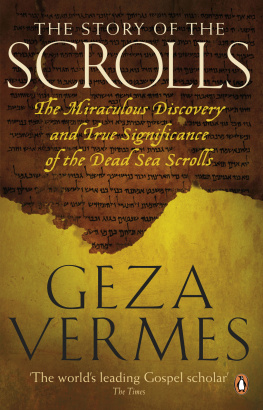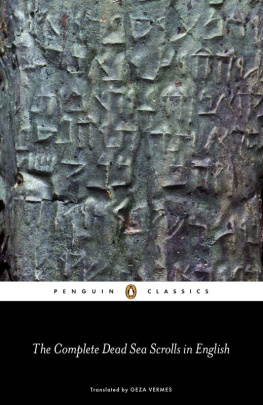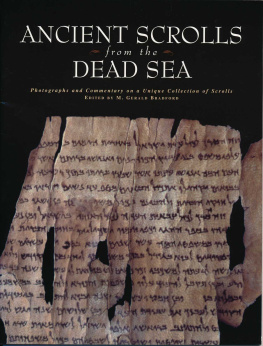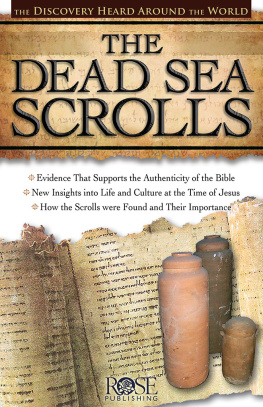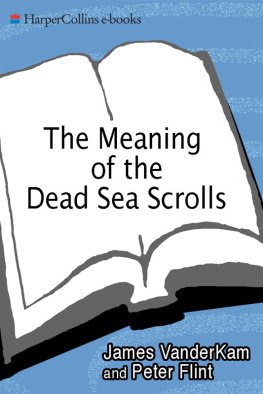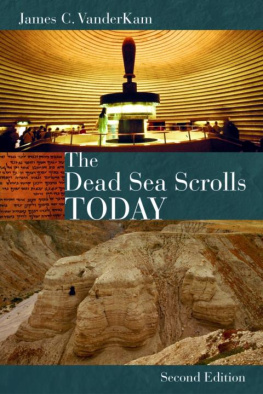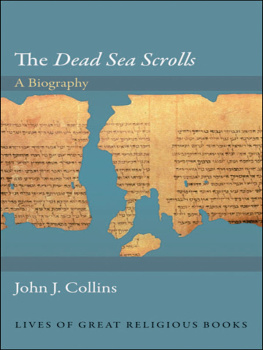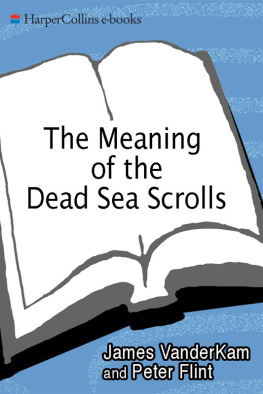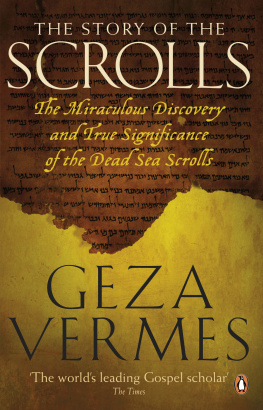PENGUIN BOOKS
THE STORY OF THE SCROLLS
Geza Vermes was born in Hungary in 1924. He studied in Budapest and Louvain, where he read Oriental History and Languages and in 1953 obtained a doctorate in Theology with a dissertation on the Dead Sea Scrolls. From 1957 to 1991 he taught at the universities of Newcastle and Oxford. His pioneering work on the Dead Sea Scrolls and the historical figure of Jesus led to his appointment as the first Professor of Jewish Studies at Oxford, where he is now Professor Emeritus. Since 1991 he has been director of the Forum for Qumran Research at the Oxford Centre for Hebrew and Jewish Studies. Professor Vermes is a Fellow of the British Academy and of the European Academy of Arts, Sciences and Humanities, the holder of an Oxford D.Litt. and of honorary doctorates from the universities of Edinburgh, Durham, Sheffield and the Central European University of Budapest.
His books, published by Penguin, include The Complete Dead Sea Scrolls in English (most recent edition, 2004), The Changing Faces of Jesus (2000), The Authentic Gospel of Jesus (2003), Whos Who in the Age of Jesus (2005) and his trilogy about the life of Jesus, The Passion (2005), The Nativity (2006) and The Resurrection (2007), republished in one volume as Jesus: Nativity Passion Resurrection in 2010. His pioneering work, Jesus the Jew (1973; most recent edition, 2001) and his autobiography, Providential Accidents (1998) are available from SCM Press, London.
GEZA VERMES
The Story of the Scrolls
The Miraculous Discovery and True
Significance of the Dead Sea Scrolls

PENGUIN BOOKS
PENGUIN BOOKS
Published by the Penguin Group
Penguin Books Ltd, 80 Strand, London WC2R 0RL , England
Penguin Group (USA) Inc., 375 Hudson Street, New York, New York 10014, USA
Penguin Group (Canada), 90 Eglinton Avenue East, Suite 700, Toronto, Ontario, Canada M4P 2Y3
(a division of Pearson Penguin Canada Inc.)
Penguin Ireland, 25 St Stephens Green, Dublin 2, Ireland
(a division of Penguin Books Ltd)
Penguin Group (Australia), 250 Camberwell Road, Camberwell, Victoria 3124, Australia
(a division of Pearson Australia Group Pty Ltd)
Penguin Books India Pvt Ltd, 11 Community Centre, Panchsheel Park, New Delhi 110 017, India
Penguin Group (NZ), 67 Apollo Drive, Rosedale, North Shore 0632, New Zealand
(a division of Pearson New Zealand Ltd)
Penguin Books (South Africa) (Pty) Ltd, 24 Sturdee Avenue, Rosebank, Johannesburg 2196, South Africa
Penguin Books Ltd, Registered Offices: 80 Strand, London WC2R 0RL , England
www.penguin.com
First published by Penguin Books 2010
Copyright Geza Vermes, 2010
All rights reserved
The moral right of the author has been asserted
Except in the United States of America, this book is sold subject to the condition that it shall not, by way of trade or otherwise, be lent, re-sold, hired out, or otherwise circulated without the publishers prior consent in any form of binding or cover other than that in which it is published and without a similar condition including this condition being imposed on the subsequent purchaser
ISBN: 978-0-14-193729-8
Preface
Graham Greene, my favourite novelist, used to call his lighthearted stories such as Our Man in Havana entertainments. Taking from him my inspiration, I would define The Story of the Scrolls as an entertainingly informative account of my lifelong entanglement with Qumran. After recounting the old saga, I will set out briefly and neatly conclusions reached in the course of sixty years of wrestling with the Dead Sea Scrolls and share with the readers my mature views on their true significance.
G.V.
The area surrounding the Dead Sea, showing Qumran
The Caves of Qumran
Part One
I
The State of Biblical Studies before Qumran
Old age carries with it a plethora of nuisances, but it possesses unique advantages too: long memories. Events and their context, about which younger generations only learn from hearsay or read in books, belong to their elders personal experience. Images are engraved in the mind; they can still be seen, their pristine reality perceived, felt and tasted. Incidents of years ago seem as though they had happened yesterday. Memory, it is true, often plays small tricks which tend to embellish or to distort the past. But events that made a profound impact on ones mind frequently retain much of their original and authentic import and flavour. Having lived through them makes all the difference. For me, these considerations are especially true for my obsession with the Qumran Scrolls.
By accident or by grace, for over more than half a century I have had the good fortune to be actively involved in the saga of the Dead Sea Scrolls. I have watched the story unfold before my eyes. This is why the reader needs to be acquainted with my credentials.
In 1947, when the first scrolls were discovered at Qumran, I was an undergraduate of twenty-three, with horrible experiences of the war behind me, entailing the loss of my parents in the Holocaust. But I was also fired with curiosity and desperately longed for intellectual challenge and adventure. When I began to write this book in 2007, the sixtieth anniversary year of the first Scrolls find was being celebrated the world over: from Ljubljana in Slovenia, a rather unlikely place for the International Organization of Qumran Studies to foregather, followed by conferences in Britain and Canada, and ending with the mammoth international jamboree of the Society of Biblical Literature and the greatest ever exhibition of original Dead Sea Scrolls in the Natural History Museum in San Diego on the Pacific coast of the United States. Not to be outdone by the rest of the world, the Israeli confraternity of Qumran academics was preparing another sumptuous gala in 2008 to mark, I suppose, the start of the seventh decade of the era of the Scrolls. It was followed by another congress in Vienna and a further one was scheduled in Rome in 2009.
Between 1947 and the present day much water has flowed under the bridges of the many cities where biblical research is pursued. As a result, the Dead Sea texts have lost the novelty they enjoyed in the early days. They have become matter-of-fact reality, something that is imagined to have always been there. Indeed, they had been there before most of the people alive today were born. Also, the then stateless young man, who in 1948 dreamed of becoming one day a recognized Qumran expert, is now the author of The Complete Dead Sea Scrolls in English in the Penguin Classics series and an Emeritus Oxford professor, though under the has been sounding title emeritus is often mistranslated as former continues to lurk much writing and a fair amount of lecturing activity. As for the Scrolls, they have ceased to be the recently discovered manuscripts as we used to refer to them in the 1950s. Bit by bit, they have found their niche in the curricula of higher education on all the continents, as well as in the pigeon-hole of Church conspiracy within the modern myth and folklore created by the international media. Even today, if the proverbial opinion pollster were to inquire in the street about the Dead Sea Scrolls, he would hear half of his clients mutter: The Scrolls Hmm Arent they old manuscripts kept locked away in the Vatican? Readers of this book, if they persevere to the end, will surely know better. They will also learn that 2009 has marked the completion of the publication of all the Qumran texts.

